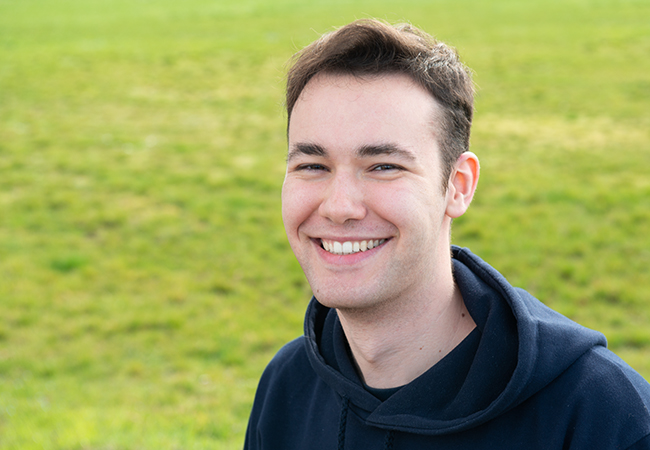With resources becoming scarcer and the growing significance of sustainability practices, it is more important than ever to inspire young people to develop innovative technologies to save resources. In the following interview, we would therefore like to give you an insight into the work of one such up-and-coming talent, our working student Samuel.

Hello Samuel, you have been enriching our team as a dedicated working student since March last year. Tell us a bit about yourself.
I come from the Bergstrasse region in Germany and have been living in Zwingenberg for a few months now.
I have been studying computer science at Darmstadt University of Applied Sciences for almost four years. I have been interested in computer science and programming in particular since about the beginning of senior high school / 10th grade.
In my free time, I also work on programming projects, from small computer games to hardware projects with microcontrollers. So, I’m just trying everything out.
What exactly do you do for our group of companies, what are your tasks?
At Innomatik in the B-IT Lab, which is part of the speedikon group of companies, I initially worked on programming projects with the hologram display and hand tracker. In other words, I created “demos” of the two hardware components.
I also completed the practical part that is required for my degree here, which involved planning and constructing a weather station with a cloud camera. The aim is to be able to forecast the energy production of the company’s own photovoltaic system from the collected data.
Can you tell us more about the cloud camera project?
The cloud camera project has been running since the end of August 2023 and was the assignment to complete my degree’s practical phase. The aim is to be able to do short-term forecasts of the energy production of the company’s own photovoltaic system based on the cloud camera data.
This is relevant as the output of PV systems is heavily influenced by external factors such as the weather. For instance, the cloud cover of the sun and the resulting influence on the solar radiation on the PV system play a primary role here.
We are carrying out this project because short-term forecasts of energy production make it possible to better guarantee grid stability and plan a company’s energy consumption in a more optimized way.
That sounds very exciting! What exactly is your role in the project?
In the initial phase, my role was to research the factors influencing the energy production of PV systems and to plan the weather camera, which was assembled with the help of colleagues and mounted on our company’s roof.
I was also largely responsible for the software implementation, although I always had someone to contact if I had any questions.
We’ve heard that the results of the project are already here – pretty fast.
Yes! Since the project was originally supposed to be implemented independently of my bachelor thesis, I started planning and developing the hardware system even before I started working on my thesis.
Accordingly, the construction of the camera system has been completed for some time now and data is already being successfully collected, with the focus naturally being on the sky images.
Based on the predicted cloud coverage, companies can estimate how effectively their PV system will operate. This makes it possible to shut down energy-intensive processes at lower output and thus achieve cost savings.
What advantages do you see for companies and the environment through the integration of these technologies?
In general, such projects are very useful for a successful energy transition towards renewable energies, not only in terms of cost-savings for companies, but also in terms of a more sustainable future.
In particular, solutions for optimizing the energy grid with PV systems are not only reasonable, but also necessary. For companies, the use of such applications and the resulting optimized energy planning could lead to cost and resource savings.
What would you like to tell other working students or companies who are interested in projects driving sustainable energy forward?
I can definitely recommend such a project, not only because of the project work and implementation of the approaches developed, but also because you are forced to deal with the current situation of energy transition and climate change.
I was particularly surprised to learn so much about developments in the field of solar energy in Germany but also worldwide.
Do you want full data transparency to increase your energy efficiency? Contact us or our sister company WiriTec on 0049 6251 584 0 or by email at info@speedikonfm.com or info@wiritec.com – together we will find a solution tailored to you and your processes.